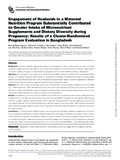| dc.contributor.author | Nguyen, Phuong Hong | |
| dc.contributor.author | Frongillo, Edward A | |
| dc.contributor.author | Sanghvi, Tina | |
| dc.contributor.author | Wable, Gargi | |
| dc.contributor.author | Mahmud, Zeba | |
| dc.contributor.author | Tran, Lan Mai | |
| dc.contributor.author | Aktar, Bachera | |
| dc.contributor.author | Afsana, Kaosar | |
| dc.contributor.author | Alayon, Silvia | |
| dc.contributor.author | Ruel, Marie T | |
| dc.contributor.author | Menon, Purnima | |
| dc.date.accessioned | 2022-03-07T05:59:49Z | |
| dc.date.available | 2022-03-07T05:59:49Z | |
| dc.date.copyright | 2018 | |
| dc.date.issued | 2018-08-01 | |
| dc.identifier.citation | Nguyen, P. H., Frongillo, E. A., Sanghvi, T., Wable, G., Mahmud, Z., Tran, L. M., . . . Menon, P. (2018). Engagement of husbands in a maternal nutrition program substantially contributed to greater intake of micronutrient supplements and dietary diversity during pregnancy: Results of a cluster-randomized program evaluation in bangladesh. Journal of Nutrition, 148(8), 1352-1363. doi:10.1093/jn/nxy090 | en_US |
| dc.identifier.uri | http://hdl.handle.net/10361/16411 | |
| dc.description | This article was published in the Journal of Nutrition, Oxford Academic [© 2018 American Society for Nutrition. This is an Open Access article distributed under the terms of the Creative Commons Attribution License (http://creativecommons.org/licenses/by/4.0/) ] and the definite version is available at: https://doi.org/10.1093/jn/nxy090 The Journal's website is at: https://academic.oup.com/jn/article/148/8/1352/5040613?login=false | en_US |
| dc.description.abstract | Background: Although husbands may provide support during pregnancy, limited evidence exists on how to promote husbands' engagement and what impact it has. Alive & Thrive integrated nutrition-focused interventions, targeting both wives and husbands, through an existing Maternal, Neonatal, and Child Health (MNCH) platform in Bangladesh.
Objectives: We evaluated 1) the impact of a nutrition-focused MNCH program, compared with the standard MNCH program, on husbands' behavioral determinants (i.e., awareness, knowledge, self-efficacy) and support to wives to adopt optimal nutrition practices and 2) how much of the previously documented impact on women's supplement intake and dietary diversity was explained by husbands' behavioral determinants and support.
Methods: We used a cluster-randomized design with cross-sectional surveys at baseline (2015) and endline (2016) (n = ∼1000 women and ∼700 husbands/survey). We used mixed linear regression accounting for clustering to estimate difference-in-differences (DIDs) for impact on husbands' behavioral determinants and path analysis to examine how much these determinants explained the impact on women's nutrition behaviors.
Results: Of husbands in the nutrition-focused MNCH group, 62% were counseled by health workers, 66% attended a husbands' forum, and 34% saw video shows. The nutrition-focused MNCH, compared with the standard MNCH group, resulted in greater husbands' awareness (DID: 2.74 of 10 points), knowledge (DID: 1.31), self-efficacy and social norms with regard to optimal nutrition practices (difference: 1.08), and support to their wives (DID: 1.86). Husbands' behavioral determinants and support explained nearly half of the program impact for maternal supplement intake and one-quarter for dietary diversity.
Conclusions: A nutrition-focused MNCH program that promoted and facilitated husbands' engagement during their wives' pregnancies significantly improved husbands' awareness, knowledge, self-efficacy, and support. These improvements substantially explained the program's impact on women's intake of micronutrient supplements and dietary diversity. Targeting wives and husbands and designing activities to engage men in maternal nutrition programs are important to maximize impact. This trial was registered at www.clinicaltrials.gov as NCT02745249. | en_US |
| dc.language.iso | en_US | en_US |
| dc.publisher | Oxford Academic | en_US |
| dc.relation.uri | https://academic.oup.com/jn/article/148/8/1352/5040613?login=false | |
| dc.subject | Bangladesh | en_US |
| dc.subject | Cluster-randomized trial | en_US |
| dc.subject | Interpersonal counseling | en_US |
| dc.subject | Engagement of husbands | en_US |
| dc.subject | Maternal nutrition program | en_US |
| dc.title | Engagement of husbands in a maternal nutrition program substantially contributed to greater intake of micronutrient supplements and dietary diversity during pregnancy: Results of a cluster-randomized program evaluation in Bangladesh | en_US |
| dc.type | Journal Article | en_US |
| dc.description.version | Published | |
| dc.contributor.department | Brac James P. Grant School of Public Health | |
| dc.identifier.doi | https://doi.org/10.1093/jn/nxy090 | |
| dc.relation.journal | The Journal of Nutrition | |

